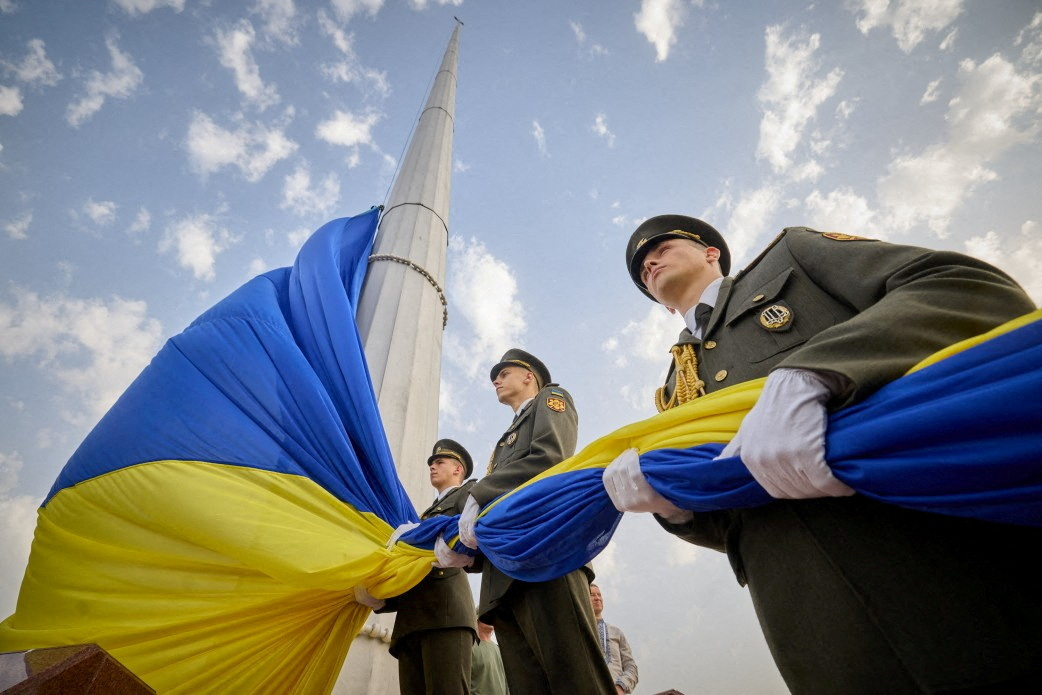
With Ukraine set to mark its independence from Soviet rule in 1991 and six months since Russian forces invaded, President Volodymyr Zelenskyy warned of the risk of “brutal strikes” by Russia and said any attack would provoke a powerful response.
Zelenskyy, who has led his country’s resistance since Russian troops poured over the border on February 24, also said Ukraine would restore its rule over the Crimea region – annexed by Russia in 2014 in a precursor to this year’s invasion.
Zelenskyy had warned at the weekend that Moscow might try “something particularly ugly” in the run-up to Independence Day on Wednesday.
“They will receive a response, a powerful response,” he told a news conference on Tuesday. “I want to say that each day … this response will grow, it will get stronger and stronger.”
In an evening video address hours later, he said: “Tomorrow is a important day for all of us – it is also, unfortunately, important for our enemy. We must be aware that disgusting Russian provocations and brutal strikes are possible tomorrow.”
There was growing unease among Ukraine’s Western allies that attacks could be planned by Moscow on government and civilian targets during the national holiday.
The United States reinforced those concerns when its embassy in Kyiv issued a security alert on Tuesday, warning that it “has information that Russia is stepping up efforts to launch strikes against Ukraine’s civilian infrastructure and government facilities in the coming days”.
“The Department of State has information that Russia is stepping up efforts to launch strikes against Ukraine’s civilian infrastructure and government facilities in the coming days,” the US Embassy in Kyiv said in a statement.
US citizens should leave Ukraine “now”, and by their own means, if possible, the embassy said.
“The US Embassy urges US citizens to depart Ukraine now using privately available ground transportation options if it is safe to do so.”
Speculation that Russia plans attacks to coincide with the holiday follows a ban by the Ukrainian government on Independence Day celebrations in the capital, Kyiv.
Kyiv is far from the front lines and has only rarely been hit by Russian missiles since repelling a Russian ground attack in March.
‘Something particularly cruel’
Over the weekend, Zelenskyy already sensed a looming threat when he said in his daily address that “we should be aware that this week Russia may try to do something particularly nasty, something particularly cruel”.
The heightened state of concern also comes amid Russia’s claim that Ukrainian intelligence was responsible for the car bombing over the weekend that killed Darya Dugina, 29, the daughter of a leading right-wing Russian political analyst. Ukraine has denied involvement.
A commentator with a nationalist Russian TV channel, Dugina died when a remotely controlled explosive device planted in her SUV blew up on Saturday night as she was driving on the outskirts of Moscow.
Al Jazeera’s Teresa Bo, reporting from Kyiv, said that Ukrainian cities are on high alert ahead of independence day.
“All major cities in Ukraine, including Kyiv, are on high alert, especially after President Volodymyr Zelenskyy warned that Russia might try to carry out vicious attacks after a warning by United States intelligence services that Russia may be planning attacks against government buildings and infrastructure. And also after Russia blamed Ukraine – a Ukrainian woman of being behind the killing of Darya Dugina,” Bo said.
“So, certainly, people here are on high alert. But President Zelenskyy also said today that if Russia carries out an attack, Ukraine is going to be ready to respond,” she said.
Child casualties
The growing sense of concern has also been compounded in recent days as Europe’s largest nuclear power plant, at Zaporizhzhia in southeastern Ukraine, has come under continued shelling and fighting, leading to fears of a nuclear catastrophe.
The Office of the UN High Commissioner for Human Rights also said on Monday that 5,587 civilians had been killed and 7,890 wounded between February 24 and August 21, mainly from artillery, rocket and missile attacks.
UNICEF, the UN children’s agency, said at least 972 children have been killed or injured over six months of war.
“The use of explosive weapons has caused most of the child casualties. These weapons do not discriminate between civilian and combatant, especially when used in populated areas,” a UNICEF statement said.
Separately, Ukrainian armed forces chief General Valerii Zaluzhnyi provided what appeared to be the first public Ukrainian military death toll, saying nearly 9,000 soldiers had died in action.
Russia has not said how many of its soldiers have been killed. Ukraine’s General Staff has estimated the Russian military death toll at 45,400.
Independent verification of the military losses on both sides has not been possible.







